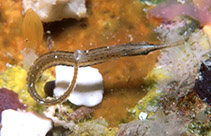| Family: |
Syngnathidae (Pipefishes and seahorses), subfamily: Nerophinae |
| Max. size: |
7 cm TL (male/unsexed) |
| Environment: |
reef-associated; marine; depth range 2 - 25 m |
| Distribution: |
Indo-Pacific: Red Sea and East Africa to the Society Islands, north to the Philippines and Guam, south to northern Australia. |
| Diagnosis: |
Dorsal spines (total): 0-0; Dorsal soft rays (total): 18-26; Anal soft rays: 4-4. Dark brown with parallel of small black spots in series along trunk, and some white speckles (Ref. 48635).
Description: Characterized by 10 caudal rays; rings 14 - 18 + 17 - 20; continuous superior trunk and tail ridges; inferior trunk ridge ends on anal ring; lateral trunk ridge confluent with inferior tail ridge; no keels in scutella; length of snout 1.8-2.4 in head length; depth of snout 3.8-5.8 in snout length; head length 4.1-5.9 in SL (Ref. 90102). |
| Biology: |
Occur on the continental shelf (Ref. 75154). Found in tide pool, seagrass, and coral reef areas. Ovoviviparous (Ref. 205). The males carry the eggs in a brood pouch which is found under the tail (Ref. 205). Males may be brooding at 3.5-4.0 cm SL (Ref. 5316). Also found in lagoons and seaward reefs (Ref 90102). |
| IUCN Red List Status: |
Least Concern (LC); Date assessed: 21 February 2015 Ref. (130435)
|
| Threat to humans: |
harmless |
Source and more info: www.fishbase.org. For personal, classroom, and other internal use only. Not for publication.
